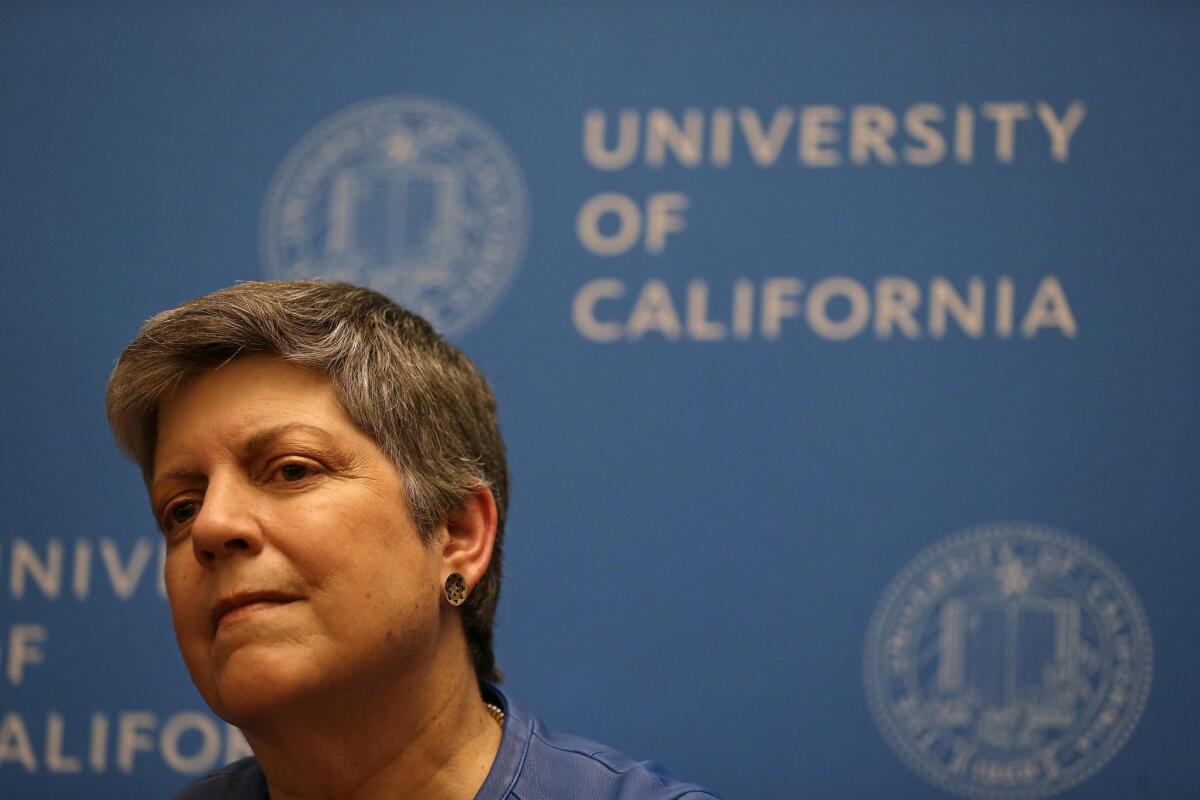UC task force unveils guidelines on fighting campus sexual misconduct

- Share via
Aiming to create a national model to combat sexual misconduct, the University of California unveiled recommendations Wednesday aimed at a more uniform, systemwide approach to preventing and responding to violence on campus.
In the first of two reports, a 29-member task force appointed by UC President Janet Napolitano presented to regents proposals for increased training, education and services.
“The message is a very simple one,” Napolitano said in an interview. “Our students and faculty and staff should be safe. We will not tolerate sexual assault on our campuses.”
The recommendations include:
-- Mandatory education and training of all students, staff and faculty on sexual misconduct. The task force specifically recommended separating the issue of sexual assault from alcohol awareness education to avoid blaming the problem on alcohol rather than the perpetrator.
-- Establishing an independent and confidential advocacy office for sexual violence and assault. The offices, to be located on every campus, would support those who suffer from not only sexual assault but also stalking and domestic violence.
-- Establishing a systemwide website to allow easier access to information about how to prevent, report and respond to sexual misconduct.
-- Creating a systemwide effort to collect data on sexual misconduct cases and their outcomes.
-- Intensifying efforts to publicize the issue and UC resources for dealing with it.
Napolitano said all campuses have policies in place to prevent and respond to sexual misconduct, including some of those recommended by the task force. But she said she would use her position to “push the timing so there is a sense of urgency” in adopting a systemwide approach.
The recommendations come as federal and state officials increasingly crack down on campus sexual misconduct after years of campaigning for tougher actions by student activists.
In the last three years, the U.S. Department of Education has launched more investigations, released more guidelines, received more complaints and issued more fines against universities for faulty reporting of sexual misconduct and harassment than ever before.
Yet many U.S. colleges and universities are still falling short in handling sexual misconduct cases, with efforts hobbled by inadequate training and limited reporting channels, according to a national survey by U.S. Sen. Claire McCaskill (D-Mo.) released in July.
A University of California survey released in March found that 6% of undergraduate respondents reported experiencing unwanted sexual conduct, including forced fondling and rape.
A UC student survey in August by task force member Savannah Badalich and three other students found significant problems in campus handling of sexual assault complaints. Although the survey yielded only 263 responses, many of those who replied said they had not received any education about preventing sexual assault or been informed of their rights to academic and mental health services following an assault.
Many also said they chose not to report the alleged assault because they balked at the difficult reporting process or were afraid of hurting their reputations or being punished for underage drinking. Some also reported that administrators, faculty and staff were rude and insensitive in dealing with accusers during the process, causing them to feel blamed and discouraged.
Badalich, a UCLA student, said the task force recommendations were squarely aimed at altering such campus attitudes. “We want to change the culture from silence and stigma to acceptance and healing,” she said.
She added that the UC initiative marked a major advance for the movement to combat campus sexual harassment and assault.
“This comes from years of student activism,” she said. “To see it come to fruition is awesome.”
Task force members, who included UC regents, campus police officers, administrators, faculty and staff, reviewed campus processes, practices from 115 other universities and academic research. More than 100 UC representatives participated.
But the complexity of the problem will require nearly another year for the task force to complete its work. Detailed recommendations in such key areas as investigative procedures, for instance, will not be presented until next year. Coordinating parallel investigations into sexual assault complaints by campus administrators and police, for instance, “must be managed in the right way,” said Napolitano, a former U.S. secretary of Homeland Security and state attorney general.
Funding for the new initiative is still being reviewed, Napolitano said. It is not clear, for instance, how much it will cost to train all students, faculty and staff and create a confidential advocacy office on every campus.
But she vowed that UC would set the pace for how to combat the problem.
“UC ought to be the national leader here,” she said. “Rather than just sit back and get complaints, we’ve got to take the issue on proactively.”
UC regent and task force member Bonnie Reiss said the recommendations are “powerful,” but that “we need to see the same level of intensity in overseeing their implementation.”
Twitter: @teresawatanabe
More to Read
Sign up for Essential California
The most important California stories and recommendations in your inbox every morning.
You may occasionally receive promotional content from the Los Angeles Times.










